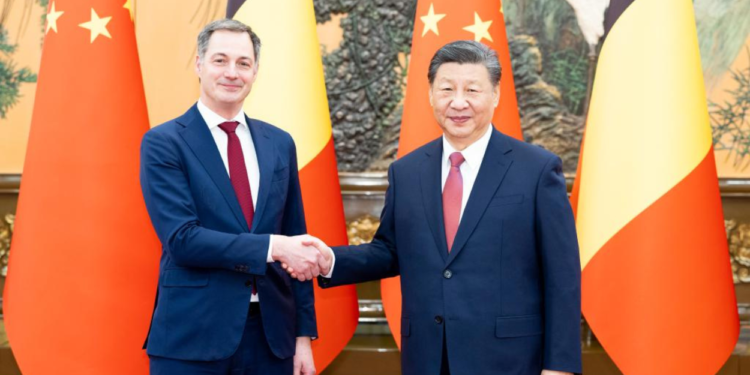Brussels ( Brussels Morning) – Belgian Research Hub Restricts Collaboration with China Amid Geopolitical Tensions; Prioritizes Research Security and Strategic Partnerships for Innovation.
The European Union’s leading research hub is second-guessing some of its global collaboration in the face of growing realpolitik. The Belgian university town just east of the capital Brussels will be in the international spotlight when trade and technology officials of the EU and the US gather on Thursday and Friday for a discussion of the EU-U.S. Trade and Technology Council (TTC).
Its leading university KU Leuven has recently banned common projects with Chinese universities with connections to the country’s military, known as the Seven Sons of National Defense. It has also barred Chinese researchers from projects that it considered risky because the applications could be utilised for military purposes, the head of the university, Luc Sel said.
Both Europe and the US are increasingly nervous about engaging with geopolitical rival China over worries Beijing is using sharp technology against their interests. That doubt has led to calls to disassemble Europe’s and the U.S.’s reliance on China in domains like microchips, quantum computing and artificial intelligence — including by shoring up “research security.” Traditionally, Leuven has been formulated as a neutral place where companies and researchers from across the world can cooperate to push the limitations of next-generation technology.
Leuven’s model of tight collaboration with key players in Europe and elsewhere has grown over decades. The city’s university KU Leuven is the ultimate beneficiary of grants under Horizon Europe, the EU’s flagship research and development agenda. Its crown jewel is the research institute Imec, a world authority in microelectronics research, which is on the agenda of U.S. Secretary of State Antony Blinken for a stay on Thursday. “A company like Imec, that’s about cooperation. They’re capable of letting Apple and Samsung work together on innovation,” Leuven Mayor Mohamed Ridouani said. Corporate competitors “work through Imec on creation that benefits everyone,” he said.
That model of exposure is now under threat. In an interview in mid-March, Imec Chief Executive Officer Luc Van den Hove stated geopolitical developments have increasingly constructed it “impossible to work with everyone.” Imec’s key allies are the U.S., Taiwan, South Korea and Japan. Partnerships with China have been “drastically reduced,” he stated. KU Leuven has also expanded its scrutiny of research collaborations, its head Sels said. There is now a “strictness that we didn’t have when I evolved rector in 2017,” he stated in the run-up to the TTC meeting.
The university brags a country-agnostic policy (with abnormalities for full-on boycotts on ties to Iran and Russia). Three committees consider research collaborations for possible human rights breaches, the risk of research misuse and its general protection. As a rule, the university doesn’t cooperate with China’s defence universities which are the domain of the Seven Sons of National Defense, a collection of universities affiliated with the country’s industry ministry and thought to have close links to its army. The Flemish government, which represents education policies for Belgium’s northern region including in Leuven, recently denied new collaborations with the grouping, it said in January.
Sels said he had also denied three China-funded scholarships earlier this year, expressing that the university had a hunch the research could be utilised for for military as well as civil applications (so-called dual-use research). Sels stated that Chinese counterparts, too, have increasingly told European allies that they don’t want to collaborate in exposed areas of research like semiconductors and artificial intelligence. Strangely, the university head stated, that has unlocked easier conversations around collaboration in other areas like climate change. Sels warned not to cut off all ties to China as a rule because that would hurt Europe even more.




